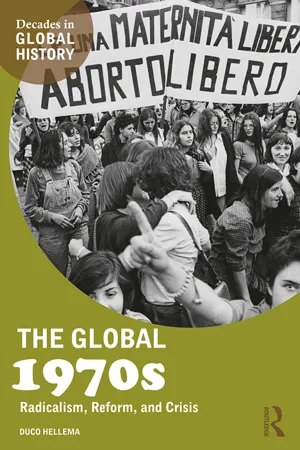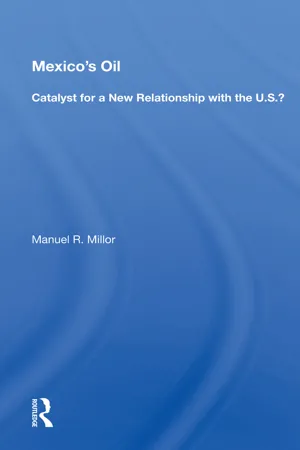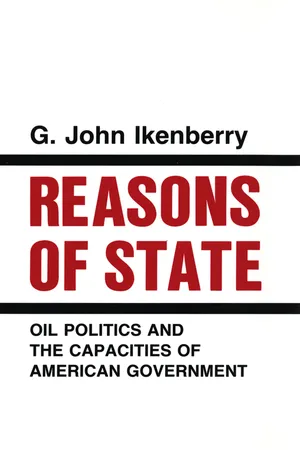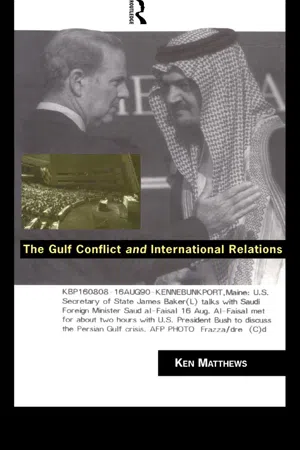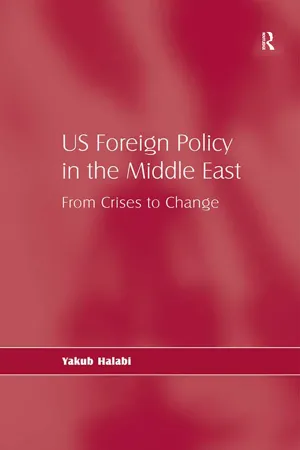Economics
Oil Crisis
The oil crisis refers to a period of severe disruption in the supply and price of oil, typically resulting from geopolitical tensions, natural disasters, or other factors. This can lead to significant economic impacts, including inflation, reduced consumer spending, and increased production costs for businesses. The oil crisis of the 1970s, for example, had far-reaching effects on global economies and energy policies.
Written by Perlego with AI-assistance
Related key terms
6 Key excerpts on "Oil Crisis"
- eBook - ePub
The Global 1970s
Radicalism, Reform, and Crisis
- Duco Hellema(Author)
- 2018(Publication Date)
- Routledge(Publisher)
6Crisis in the World Economy From the mid- to the late 1970sBy the mid-1970s, economic prospects were rapidly deteriorating everywhere in the world, the result of the Oil Crisis that broke out in the wake of the 1973 October War. Growth declined, inflation increased, and unemployment began to rise. As we have seen in previous chapters, the Oil Crisis and the economic recession of the mid-1970s affected the political atmosphere in large parts of the Western world. Budget cuts and austerity measures became inevitable, while reform plans had to deal with increasing financial problems. The Oil Crisis had a similar or even worse impact in other parts of the world, not least in the developing countries. In this chapter, we pay more systematic attention to the origins and the consequences of this mid-1970s worldwide economic recession. It was in many ways a truly global phenomenon, and as several commentators pointed out at the time, an example of increasing economic interdependence, viz. globalization.The Oil Crisis, its global impact, and its economic and political consequences are often presented as the start of a new era. Some authors even suggest that the seventies (in this case the ‘short’ seventies), the period of crisis and malaise, in fact began in 1973, dividing the 1970s into a progressive first half (the culmination of the 1960s, as some historians argue), and a conservative or neoliberal latter period (the start in fact of the eighties). In other words, the Oil Crisis acted as a global ‘game changer’, by undermining hitherto accepted political and economic paradigms and forcing states and other political actors (parties, unions) to adapt to the new circumstances. Yet, such conclusions are too easy. The Oil Crisis was in many ways the result – or culmination – rather than the negation of developments of the preceding years. The decisions of the Arab oil-producing states were a product of the growing non-Western assertiveness we have discussed in Chapter 4 - eBook - ePub
Mexico's Oil
Catalyst For A New Relationship With The U.s.?
- Manuel R. Millor(Author)
- 2019(Publication Date)
- Routledge(Publisher)
Even though the OAPEC agreement stipulated that it would not affect the functions of OPEC, the fact that the Arab countries felt the need to underscore their common economic and political objectives was indeed significant. 7 Arab militancy, reinforced by political-military events in 1973, i.e. the "Yom Kippur" war, that galvanized Arab countries into action, came to the fore in unprecendented oil price increases: from 2.48 dollars per barrel in 1973 to 11.56 dollars in 1974, that is, an increment of 366 percent. 8 This action, in effect, signaled the end of the era of cheap energy. The energy crisis, in plain terms, has meant a disruption in the production and commercialization processes of the main energy source in the contemporary world: from 4 0 percent to 50 percent of all the energy consumption comes from crude oil or derived products. But its causes and outcomes are not a matter easily agreed upon. According to various diverging perspectives, the roots of the energy crisis can be located in: the actual or imminent scarcity of world energy reserves, especially petroleum; the instability in the international oil supply, manifest through price variations and insecurity in the supplies; and the environmental and social degradation due to the growing dependence on oil and coal to meet energy demands. 9 Obviously, the relative weight of these factors, especially the first two, is directly related to the political context - eBook - ePub
Reasons of State
Oil Politics and the Capacities of American Government
- G. John Ikenberry(Author)
- 2018(Publication Date)
- Cornell University Press(Publisher)
The United States, though less dependent on imported OPEC oil than other industrial nations, was no less pressed to decide how to adjust its economy and society to new international energy markets. Higher energy costs engaged officials responsible for both foreign policy and domestic policy, and proposals for action found their way onto many different policy agendas. Across political and economic life, very little was beyond the reach of the oil price revolution.International crises of this sort pose intriguing questions for students of politics. Crises are, as one analyst notes, “critical moments when national character and institutions [are] thought to be decisively tested.”2 I share the conviction that political responses to crises can reveal essential characteristics of a nation’s institutions—their capabilities and their limitations.In this book I am interested in two particular issues. One is the capabilities of nations and limitations on their cooperation to address the common dilemmas of the oil shocks. The possibilities for cooperation among the advanced industrial nations were obvious. Why did cooperation among oil-importing industrial nations prove so elusive? The other issue is the capabilities of politicians and executive officials, particularly in the United States, to direct the course of energy adjustment. What resources and mechanisms did American political leaders have at their disposal? In the case of American energy adjustment, why were so many different courses of action pursued, and why did some fail and others succeed? As I trace the circuitous path of American adjustment, both international and domestic, I answer these questions, and my answers emphasize the shaping, constraining features of national political institutions and the organizational structure of policy making.THE OIL PRICE REVOLUTION
October 17, 1973, the day of the Arab OPEC embargo, was “energy Pearl Harbor day.”3 In response to the outbreak of war between Israel, Egypt, and Syria, the Arab members of OPEC announced an embargo on oil shipments to countries supporting Israel. The United States, which was in the midst of approving emergency military assistance to Israel, was their primary target.4 - eBook - ePub
- Ken Matthews(Author)
- 2003(Publication Date)
- Routledge(Publisher)
Market prices are determined by beliefs and not by the inexorable logic of supply and demand in the market-place. Beliefs will be determined by the market makers’ understanding not only of the relationship between the supply of and demand for the commodity in question but an understanding of the factors that determine movements and changes in supply and demand— economic, social and political. War very often has a profound impact upon markets not because of the direct impact upon supply and demand for commodities but because of the uncertainties that war injects into the world economy. On top of this there is the automatic expectation that war or large-scale international crisis is bound to have an adverse effect on markets. Of course the oil crises of 1973 and 1979 had instilled in market psychology the ‘truth’ that political crisis in the Middle East gives rise to Oil Crisis. Hence the rise in the oil price from $18 per barrel to over $40 per barrel in the period after the Iraqi invasion was to some extent a ‘knee jerk’ reaction by the market. Prices reached a peak in early October 1990 after which there was a gradual general trend downwards with short-term ‘blips’ within the general trend caused by the ups and downs of crisis diplomacy. The relatively rapid downward trend was firstly a reflection of the initial overreaction of the markets to the Iraqi invasion and secondly a manifestation of a gradual return of confidence to the market as it became increasingly clear that the United States was prepared and preparing to defend Saudi Arabia (and hence her oil reserves and production) against a threat from Iraq.But a refocusing of the markets on the current relationship of supply and demand for oil also served to inject a greater sense of reality into the psychology of the market. It became increasingly clear that the market was not drastically affected by the absence of Iraqi and Kuwaiti production. Moreover the depression in demand for oil as a result of recession in OECD countries combined with high OECD oil stocks, and the storing by Saudi Arabia and Iran of large quantities of oil in tankers at sea close to major consumer countries, had turned fear of shortage into fear of glut.16 These factors were also enhanced by predictions about the likely effect of the war on politics within OPEC and the likelihood that there might be a price war and that in any case the power of Saudi Arabia within the organisation would be enhanced as a result of the war. Furthermore, there would after the war be an added incentive for Saudi Arabia to keep production high (and thus the price low) in order to foot the heavy bills being submitted by the major Coalition allies to pay for the war. Even when the war began on 16 January 1991 the blip in price up to nearly $30 per barrel was within hours down by something like $8 per barrel when it was rapidly realised that Coalition air supremacy meant that Saudi oil installations were essentially immune from Iraqi air attack. Thus oil, over which many claimed the war was being fought, had become irrelevant to it within hours of its beginning.17 - eBook - ePub
US Foreign Policy in the Middle East
From Crises to Change
- Yakub Halabi(Author)
- 2016(Publication Date)
- Routledge(Publisher)
The crisis took the Western world by surprise. For many years, it had been accustomed to inexpensive oil and it was unprepared for a sharp rise in oil prices. During the embargo, the price of an oil barrel nearly quadrupled within three months to almost $12. In the words of Henry Kissinger, ‘the oil price shock caused a deadly combination of severe recession and high inflation which, in the United States, reached 14 percent a year at its height. The energy crisis was even more disastrous for the non-oil producing nations of the developing world’ (Kissinger 1999, 664).Furthermore, the transfer of capital from developed countries to oil-producing countries created a trade deficit for the former of $40 billion at current prices. ‘[M]uch of the world’s wealth had suddenly shifted to an obscure corner of the world’ (Sampson 1975, 343). In the same vein, Walter Levy warned the West that ‘the supply of oil from individual producing countries or a group of them to individual consuming countries or a group of them might … at a time unknown, again be curtailed or completely cut off for a variety of economic, political, strategic or other reasons’ (Levy 1974, 691).Since the end of World War II, the political and economic importance of the Middle East has stemmed mainly from its oil resources, accounting for around 68 percent of the world’s total oil reserves. During the 1970s, the oil-producing nations nationalized these oil resources. Subsequently, foreign oil companies lost control not only over oil production but also over the price of oil (Gilbar 1997b, 27–8). Members of the worldwide Organization of Petroleum Exporting Countries (OPEC) then took full charge of deciding the quantity of production and, to some extent, the price of oil.Following the dramatic events in the world oil market in 1973–74 and the subsequent phenomenon of stagflation (unemployment and inflation) in some developed economies, the 1970s witnessed a debate over the durability of American hegemony in world politics, together with speculation over the repercussions of its decline on world economic stability (Keohane 1984; Keohane and Nye 1989). US hegemony was shaken by the simple fact that asymmetrical distribution of power within an issue area, rather than the overall distribution of power, determined the outcome of the embargo (Keohane and Nye 1989). Despite the overall power inferiority of the Gulf states in relation to the US, OAPEC managed to create a linkage between political events in the region and the oil market. It penalized the US for its support for Israel during the Yom Kippur War by imposing an embargo against the US, thus cutting back its essential supply of oil (Skeet 1988, 100). Thus, many of the oil-consuming nations in the West were at the mercy of OAPEC in general and the volatile political situation in the Middle East in particular. As President Carter aptly put it, ‘Our national strength is dangerously dependent on a thin line of oil tankers stretching halfway around the earth, originating in the Middle East and around the Persian Gulf, one of the most unstable regions in the world’ (quoted in Stobaugh and Yergin 1979, 570). Under these conditions, ‘Both the Nixon and Ford Administrations had no higher priority than to bring about the reduction of oil prices by breaking the power of OPEC’ (Kissinger 1999, 668). - eBook - ePub
Tourism and Oil
Preparing for the Challenge
- Susanne Becken(Author)
- 2015(Publication Date)
- Channel View Publications(Publisher)
Table 5.3 ). The Arctic, in particular, has been of growing interest to its bordering countries, despite great uncertainty over the actual size of oil resources and insufficiently defined territorial rights. Already, Russia and Canada have begun to invest in military infrastructure and ‘flex’ their muscles in relation to resource exploration in the Arctic. The reshaping of ‘state space’ and social negotiations over the conflicting goals of energy security and environmental protection, as well as the role of corporate versus public sector stakeholders, has also been illustrated for the case of Norway (Kristoffersen & Young, 2010).The inevitable and lasting increase in food prices is a major security risk identified by the German military (Zentrum für Transformation der Bundeswehr, 2010). The German report reminds us of the so-called Tortilla crisis in 2006 in Mexico that resulted from the rapid increase in biofuel production from corn. It also warns that in addition to well-known regions of humanitarian crises (e.g. sub-Saharan Africa), nuclear powers, such as India and Pakistan, could be severely affected by food shortages or prohibitively high prices. The cascading price effects of global supply chains will also affect personal mobility. Tourism in particular could be impacted as transport costs rise, and people are faced with worsening economic conditions in their home countries (see Chapter 6 ). The German military suggested that a ‘mobility crisis’ could be symptomatic of an economic crisis resulting from Peak Oil.5.3 Social Representation of Peak Oil
The public debate on Peak Oil is not well developed and restrained to a few ‘whistleblowers and dissidents [who] fill a parallel world in the “blogosphere” where polemics and eschatological thinking loom large’ (Friedrichs, 2011: 472). Bridge (2010) proposed that Peak Oil fits into a broader discourse of crisis relating to resource security, limits to growth and environmental carrying capacities. However, only a few studies have examined people’s concern about different energy futures and relatively little is known about social representations of Peak Oil (Becken, 2014; Fischer et al.
Learn about this page
Index pages curate the most relevant extracts from our library of academic textbooks. They’ve been created using an in-house natural language model (NLM), each adding context and meaning to key research topics.
